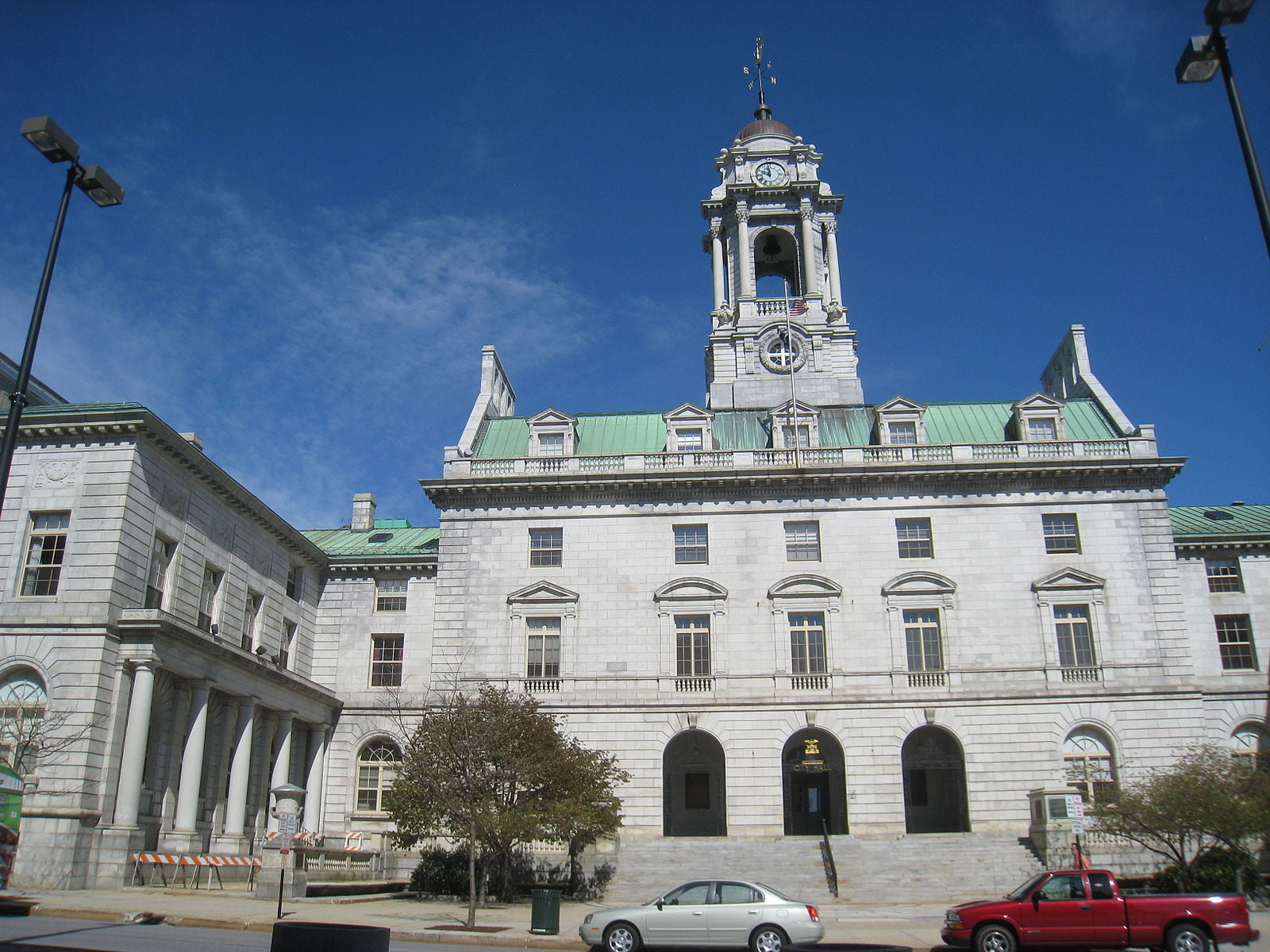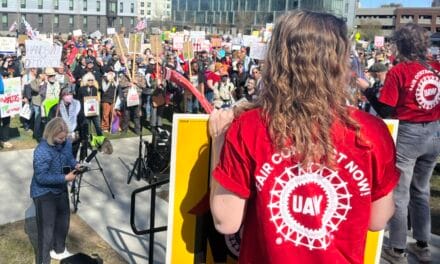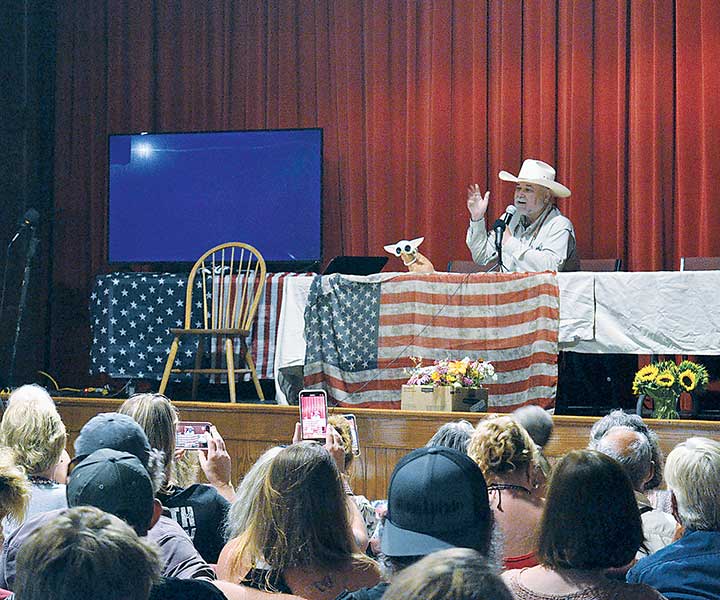On Saturday, November 15, people began to slowly trickle into Lewiston’s Franco Center as soon as the doors opened at 9:00 AM. Coming from all over the state, a few having traveled from as far as Massachusetts and New York, people were arriving for the first ever Maine Solidarity Conference, a day-long event put on by the Maine Democratic Socialists of America. Throughout the day roughly 125 people showed up, attending different panels and presentations focused on an array of issues ranging from labor to empire, from feminism to electoral politics, and much more followed by a social featuring local bands.
The statewide chapter of DSA voted to organize a fall conference last January during its Winter Semi-Annual Convention, the impetus being the rise of Trump 2.0 and the need for a stronger united front on the left. By bringing together people from different organizations and overlapping struggles who might not otherwise get many chances to share strategies and experiences, the hope was that the conference could offer a material step toward opening lines of communication and education between different movements that all share an interest in opposing the far right’s agenda.
To help achieve these goals, conference organizers arranged a great lineup of speakers intimately knowledgeable on their respective topics. To kick off the event, Cynthia Phinney, President of the Maine AFL-CIO, was accompanied on stage by Jessie Muldoon, a Portland educator and member of the Maine Education Association, and Nick Janes, from IFPTE Local 4 at the Portsmouth Naval Shipyard. Addressing the entire assembly, Phinney updated attendees on recent labor wins and upcoming battles. Jessie Muldoon added her thoughts from an educators’ perspective, speaking to the importance of keeping LGBTQ students safe, and the dangers that ICE operations around schools present for immigrant families and educators alike, creating an atmosphere of fear and insecurity that union educators are navigating and organizing around. In closing, Phinney emphasized the importance of nurturing the two-way support between local communities, movements, and labor unions, because each one makes the other stronger, and without that support each faces a much darker future.
As the opening plenary closed at 10:30 AM, attendance had begun to swell as more people arrived, grabbing coffee and mingling a bit before having to decide which of the next simultaneous panels they would sit in on. In the morning session, panels consisted of “Organizers in Office,” which focused on experiences and lessons learned by elected politicians with leftist organizer backgrounds and featured State House Representative Grayson Lookner, Portland City Councilor Wes Pelletier, and Boston DSA Co-Chair Bonnie Jin. Other attendees chose between two guided discussions. One, entitled “LGTBQ+ are Under Attack, Here’s How We Fight Back,” was led by Marianne M-W and focused on recent and potential upcoming political battles here in Maine, strategies to consider, and how folks could get plugged in. The other guided discussion was a round table on the “ABC’s of Socialism,” led by Rose D. and Beckham O., which went over the basic framework of the political theory, as well as addressed some misinterpretations often spread by conservatives.
At noon a free lunch was offered, the spread including a few varieties of sandwiches prepared by volunteers, small bags of chips, apples, granola bars, bottled water, coffee, and for those with a sweet tooth a few boxes of cadbury chocolate bars and twizzlers were donated by a friendly organization. As is typical of day-long conferences, almost like a changing of a shift, it was around this time that some attendees headed home while others arrived for the first time to catch the afternoon program.

At 1:30, folks again had their choice of three different presentations. A panel on “Building Rank-and-File Strength” featured two union organizers as speakers, Leo Hilton with IBEW and Amanda Gavin with UMaine Grad Workers affiliated with the UAW. The discussion focused on the speakers’ experiences through the lens of the rank-and-file strategy of organizing, thoughts on socialists’ role in unions, and a fruitful Q&A portion with the audience. At the same time, a panel on “Capitalist Sexism v. Socialist Feminism” was being helmed by Maddie C, Remedios, and Marianne M-W, discussing the ongoing sexist repressions tolerated under capitalism, and what socialist feminism means and how it offers liberatory solutions. But the panel that caught the most attention during this session was “Challenging the Borders of Empire from Maine to Gaza,” featuring Faisal Khan from the Carolina Peace Center and Greater Portland Immigrant Welcome Center, and Christopher Claar of the Maine Coalition for Palestine. Located at the stage, Khan and Claar discussed the concept of empire, America’s bloody role in promoting it, and the ongoing campaigns to end genocide, oppose imperialism, and push for the end of Israel’s ongoing slaughter of Palestinian lives and theft of Palestinian land.
At 3:00 the third session began, providing another difficult choice for attendees as three panels took place simultaneously. At the stage was the popular “Defending our Neighbors” presentation led by Tophe from the grassroots mutual aid organization Presente! ME, and Leo Hilton. This was more of an informational training, giving a background on the new community-based ICE Watch Hotline, and educating attendees on how they can get involved. At the same time across the performance hall was “Mapping Maine Politics,” led by Maine DSA Co-Chair Sophie G and featuring Ethan Strimling of Maine DSA and Portland Tenants Union, and Andy O’Brien of Maine AFL-CIO. Both Ethan and Andy also formerly held elected positions in State government and shared their knowledge on running local electoral campaigns, messaging strategies, and mapping electoral districts for canvassing purposes. Lastly, DSA Regional Field Organizer Eric Wimer led “Building a Mass Organization,” a skill-share offering ideas and strategies on not only how to grow DSA membership from its current 88,000 enrolled, but also how to better activate members so more people are engaging in campaigns and building the socialist movement here in the United States.
.

At 4:30, everyone reconvened for the closing plenary. With only ten days having passed since Zohran Mamdani’s big mayoral win in NYC elections, leftists in Maine and across the country were wondering what they could learn from his campaign’s victory. To help share those lessons with attendees, the plenary featured two DSA National Political Committee members, Megan Romer and Eleanor Babaev (Eleanor had also personally volunteered on Mamdani’s campaign). To give a Maine perspective, Maine DSA Co-Chair Todd Chretien joined them on stage, and the discussion was led by Dwight W. of Maine DSA.
Babaev provided a fascinating history of how NYC DSA has built up its electoral machine since 2016 when AOC was first elected. In the near decade since, NYC DSA has grown to more than 10,000 members and elected a slew of comrades to the NY State Assembly, NYC City Council, and even Congress. Although not without growing pains, the lessons learned are what made the Mamdani victory possible. Romer set Mamdani’s campaign in a national framework, arguing that DSA is on the rise, although we have a long way to go. Echoing decisions made at the National DSA Convention in August, she stressed the importance of DSA training candidates who are able to genuinely represent DSA and advocate for class struggle and democratic socialism. Chretien explained that, as a kid growing up in the 1980s in Maine, it was hard to overstate how far socialist ideas had come. Bernie 2016 and 2020 campaigns marked a shift of a whole order of magnitude, and Mamdani’s victory and DSA’s growth to almost 90,000 members today are only the most obvious signposts of that. At the same time, he argued that DSA remains marginal nationally and that the workers movement needs to grow another whole order of magnitude or more to contend for power. Furthermore, for all the good work DSA members do, DSA is far too small a vehicle to contain the coming wave of working-class opposition to the billionaire class. DSA will have to learn to create alliances in movements and support campaigns that do not always carry the democratic socialist label.
As the panels and presentations finished, it was time to unwind and socialize. Pizzas were ordered and around 7:00 PM a line-up of local bands took the stage for a cathartic concert. Analog Film, Angus is Dead, Bill Blizzard, and Megafun Microphone all took turns blasting out tunes as the remaining attendees let off some energy, danced around, and cheered them on. And at 9:00 PM, as the last of the bands wrapped up, event organizers and attendees agreed: the first Maine Solidarity Conference was an educational success. But there is still so much work to do, after all, Rome wasn’t built in a day.




